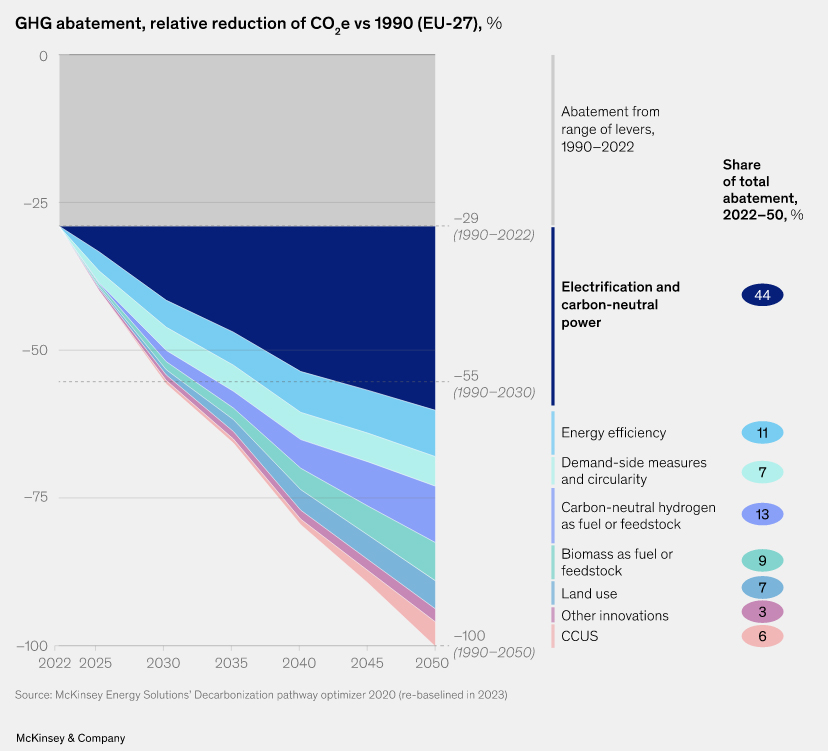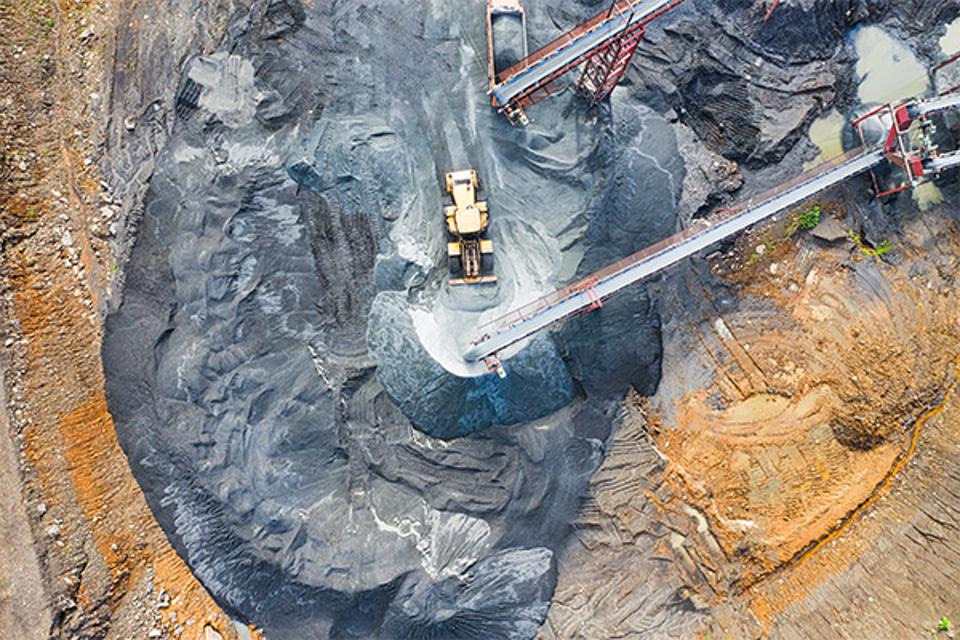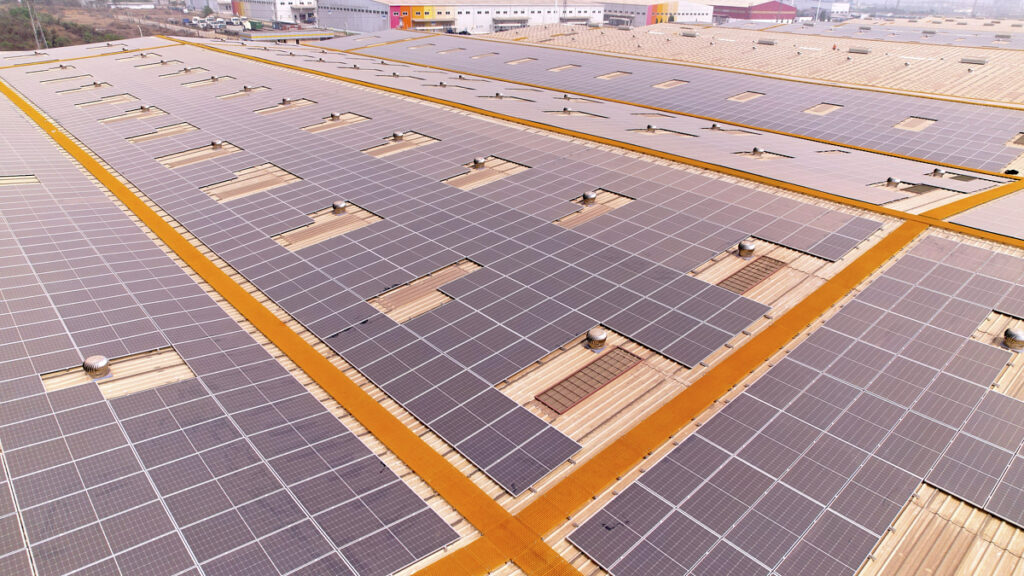MCKINSEY: ELECTRIFICATION IS A CRUCIAL DECARBONIZATION LEVER FOR INDUSTRY
 Today, energy use in industry contributes to roughly one quarter of greenhouse gas emissions around the world. Of this, roughly two thirds are used to generate process heat. This means that industry has a pivotal role to play in the world’s battle against climate change.
Today, energy use in industry contributes to roughly one quarter of greenhouse gas emissions around the world. Of this, roughly two thirds are used to generate process heat. This means that industry has a pivotal role to play in the world’s battle against climate change.
Global consultancy McKinsey and Company expects electrification and carbon-neutral power to be the primary focus of decarbonization efforts for industry between now and 2050. Writing in the Industrial Electrification Outlook segment of their wide-ranging Global Energy Perspective 2023, McKinsey’s researchers expect electrification (the switch from fossil fuel-based systems to electricity-based systems) “to be a crucial lever to help achieve decarbonization goals.” This is because “electricity-based systems tend to be less emissive than [the] fossil fuel-based systems” that dominate industrial power and heat generation today.
The chart at right shows McKinsey expects the combined effects of increased electrification and carbon neutral power to account for as much as 44 percent of total greenhouse gas abatement between 2022 and 2050.
Parallel tracks
To achieve this, it is essential that increased electrification efforts and growth in carbon-neutral power generation take place together. The authors write:
“Due to increased electrification (as well as other factors, such as population growth), electricity demand is projected to increase two-to-threefold by 2050, depending on the energy transition scenario, with industry, buildings, and transport, alongside green hydrogen production, projected to be the largest consumers. To meet current demand, electricity generation today accounts for around 40 percent of global greenhouse gas (GHG) emissions. Since projected rising demand could see increased emissions unless electricity generation is decarbonized, switching to carbon-neutral power generation would be a crucial decarbonization lever, alongside mass electrification.”
Thus, they expect that electrification will drive the uptake of enabling technologies across scenarios, and vice versa. They write, “The trend toward electrification technologies and the increased availability of renewable energy sources—as well as their projected increasing affordability—is expected to drive demand for enabling systems and require a strong end-to-end supply chain to support the uptake of these applications.”
Read McKinzie’s report here.
RARE EARTH DISCOVERY IN WYOMING COULD EASE SUPPLY CRUNCH

Tom Fisk – Pexels
The McKinsey report cited above notes “several bottlenecks along the electrification supply chain” that would need to be overcome to enable the uptake of clean electrification technologies. In particular, “shortages of critical materials could cause project delays, as materials supply might fall behind demand … Additionally, supply chains for key components are geographically concentrated, with local capacity becoming increasingly relevant.”
Of particular concern is the extreme concentration, particularly in China, of production of rare earth minerals needed for batteries and other transition electrification technologies. That’s why it comes as good news, via Oilprice.com, that several American companies have recently discovered massive rare earth deposits in the state of Wyoming. According to the report, “current estimates place the reserves’ potential value in the billions.”
Since the United States currently imports a large portion of rare earth magnets and minerals from China, the recent find may “lessen its reliance on foreign suppliers—especially China while diversifying its rare earth supply chain.”
Moreover, the Wyoming discovery makes it likely that the United States will become a major participant in the international rare earth market. This would in turn lessen the susceptibility of the U.S. and its trading partners to supply chain disruptions and geopolitical unrest.
None too soon, as China, which presently processes around 90% of the rare earths produced worldwide, has recently placed harsh restrictions on the extraction and separation of rare earth minerals.
Read more.
A RECORD SOLAR YEAR FOR AFRICA

AFSIA
The Africa Solar Industry Association reports that at least 3.7 GWp of new solar power generation was to come online across Africa in 2023 – the best single-year performance ever recorded. According to the organization’s Annual Solar Outlook 2024, With this 2023 addition, “Africa is now home to more than 16 GWp of solar.”
Interestingly, the report notes that while the solar growth rate was similar around the world, “the drivers of that growth may be fundamentally different” for Africa. “In Europe, the US and China,” the authors write, “most of the added capacity is the result of government programs and tenders, leading to large utility-scale projects being connected and injecting into the grid … In Africa however, the picture seems to be very different. Most of the added capacity in 2023 was through C&I projects (65%).”
In other words, “In Africa, new solar additions have mostly been driven by economic decisions of the business community. In absence of reliable utility companies and grid supplying the required electricity, African companies and businesses finally have found an alternative with solar and storage.” The report continues, “This is great news for the continent’s economic activity, but this also becomes a serious threat to national utility companies that have been struggling financially for years and whose financial balance is not going to improve with more and more large customers covering a large portion of their electricity consumption with their own solar energy and/or going completely off-grid.”
Read our article on Green Industrial Development Zones for Africa and elsewhere here.
FOLLOW & JOIN 247Solar
Contact: info@247solar.com